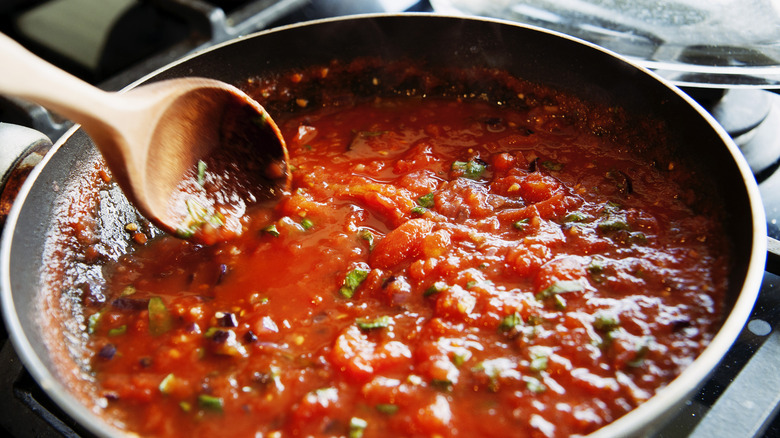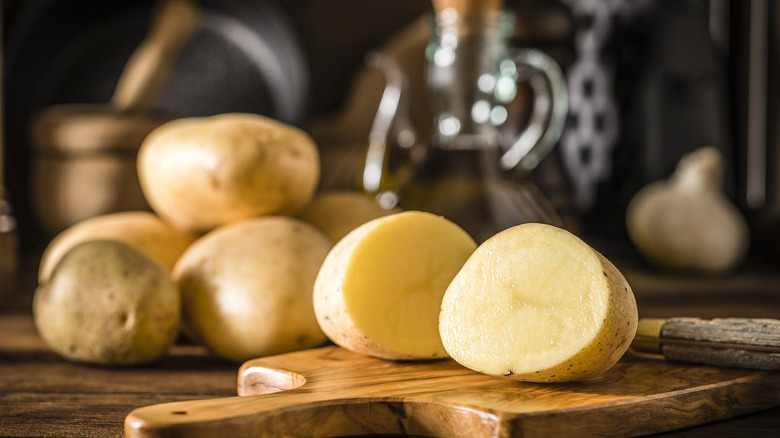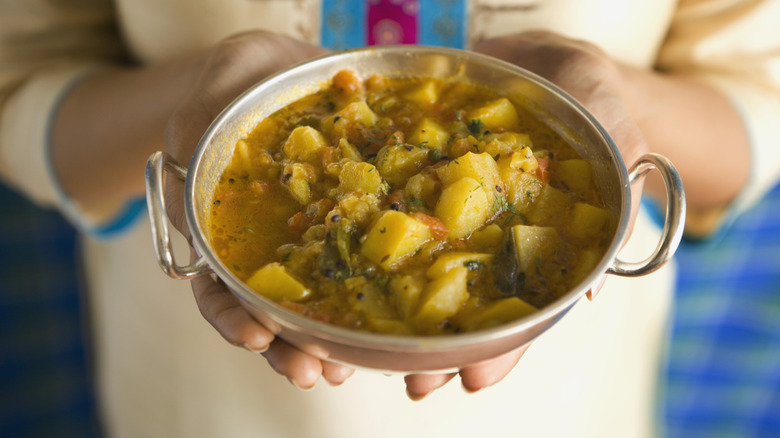Rescue Oversalted Sauces With A Single Slice Of Raw Potato
An oversalted sauce is one of the most common and annoying mistakes that can happen in the kitchen. There aren't many ways to combat a super-salty sauce, besides adding more of all of the other ingredients in the recipe — and that depends entirely on whether or not you even have extra ingredients around. However, if you have fresh potatoes in the pantry, you're in luck. Something you probably didn't know about potatoes is that this humble tuber can make soups, stews, and sauces less salty.
First, wash and peel a raw potato, then cut out a thick slice and place it into your pot of salty sauce. Let the potato slice simmer for approximately 15 minutes before taking it out and discarding it. Make sure to keep the heat on low while simmering the sauce, or too much water could evaporate, concentrating the mixture's flavors and bring out the saltiness even more. If you run into this issue, add a little bit of water to compensate for the moisture loss. If you're careful, though, the raw potato can do all the work for you and give you a sauce that tastes less salty. This seemingly magical effect is due to the veggie's starchiness.
A potato's starches are the key to its absorptive powers
Potatoes can suck up some of the salty liquid in a sauce due to the way their plentiful starches gelatinize when met with water. Gelatinization happens when starch and liquid molecules meet heat, causing the starches to absorb water and swell up. Starchy russets are the best kind of potato for this trick, though waxy varieties such as Yukon Golds are also viable alternatives. Just make sure to peel your potato in order to maximize the amount of starchy surface area that comes in contact with your sauce.
Keep in mind that potatoes won't eliminate all of the saltiness in a soup or sauce, and therefore should not be considered a panacea for an unpalatably salty condiment. Be prepared to add some water or use other diluting methods if the raw potato slice doesn't fix the problem, and remember that it's best to avoid over-seasoning your sauce in the first place.
Maximize your chances of saving a sauce by adding fat or acid
This potato trick works best in tandem with other kitchen hacks that can help mask saltiness in food. One way to combat saltiness is to add sour ingredients to mask the briny taste. Lemons, limes, and/or vinegar may be lying around in your kitchen, providing you with a quick and convenient way to combat excess salinity. Choose an acidic ingredient that will complement the flavor of your sauce. Fat also works fairly well at hiding unwanted saltiness. Many sauces already call for fatty dairy products like cream or milk, so you may have luck with adding just a bit more dairy to reduce the intensity of the salt.
Combine these tips with the absorptive powers of a peeled potato slice and your sauce will have a much better chance of becoming palatable. Just don't forget that adding fat and acid will change the taste and texture of the sauce. If you don't want that, try the potato slice trick — which won't alter the flavors at all — before resorting to other solutions.



